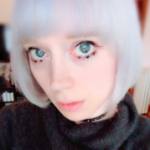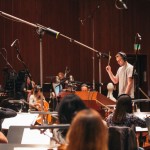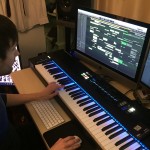You should know all about Unique Note by now. We featured President Tetsuya Shibata and Vice-President Yoshino Aoki last year after they left Capcom to strike it out on their own, and we were able to catch up with them at GDC to find out what they’ve been up to and ask some other unconventional questions in more of an informal chat than an interview.
Ever wonder if it’s acceptable for women to go out drinking with the guys in Japan? Or wonder how Yoshino Aoki, the only female working on Suikoden Tierkres, got stuck working with the cute half-dolphin creatures called the Poirpose? We have the answers here along with details on some of the projects they’ve worked on over the past 8 months, and we also learn about the pseudonym that Tetsuya Shibata released under on the Yuusha 30 soundtrack.
All this and more in our GDC interview after the jump!
OSV: We’re here with Tetsuya Shibata and Yoshino Aoki, both from Unique Note here at GDC. We had talked to you guys right when you started the studio about 6 months to a year ago. We haven’t talked about what you’ve been working on since then, so perhaps you can tell us what you’ve been up to.
Shibata: So, we started up in July 2009, and had a musical that we worked on that kept us busy until August. We’ve had a few game projects here and there since then.
OSV: So, a musical? You did the music, and Aoki-san did the lyrics? Or were you just responsible for the music?
Aoki: We were in charge of certain pieces, but it was a collaboration.
Shibata: There was another composer who was the script writer and composer, and he wrote some of the music as well.
OSV: And what was the name of the production?
Shibata: Suisei musical. Or Stardust in English.
OSV: With your experience being mostly in game, how different was it working on a stage production like this?
Aoki: We had to write something catchy that was memorable instantly. It was very demanding. When we wrote something sophisticated, we were often asked to rewrite it later on.
OSV: And you were only given 2 months?
Aoki: Yeah, only 2 months.
OSV: And how many pieces was that?
[Shibata and Aoki converse]
Shibata: As the group was rehearsing for the musical, they found out certain sections of dialogue took longer than expected, so we were constantly making changes to our work. There ended up being about 200 different pieces of music.
OSV: Wow, and how many minutes did that come out to?
Aoki: The longest piece was about 6 minutes. The shortest was about 10 seconds.
OSV: What genre was this music? Did you get to experiment at all?
Shibata: Mainly pop.
OSV: I have to hear this! Will there be any sort of CD release?
Shibata: Probably not.
OSV: How did you guys get this gig in the first place?
Aoki: The guy who was running the production knew some people at Capcom, and we were introduced through them.
OSV: Very good. So you mentioned that you’d been working on some game projects. Are you able to tell us about these yet?
Shibata: We did Yuusha 30. I did this while I was at Capcom, and the game was released after I left, so I’m actually credited under a different name. Aoki-san also worked on the title.
OSV: Oh, you wrote using a pseudonym? Now that you’re out on your own, are you able to tell us what name you used?
Shibata: It was Toru Nakagawa.
OSV: Very cool. I’ll have to check that out. I remember seeing that release. It had a number of composers working on it, right?
Shibata: Yeah, that’s right. We also did Full Metal Alchemist for the PSP.
OSV: Ah, the entire soundtrack, or just a part of it?
Shibata: We just did some of the music. And Aoki-san sang on it as well.
OSV: Oh, did you get to write the lyrics as well?
Aoki: I wrote the lyrics, but the request from the company was to create a fake language.
OSV: Oh, so it’s not in Japanese? You had to create a unique language?
Aoki: Yeah.
OSV: Was it for a specific race of creatures in the game or something?
Aoki: At first we had certain words in the songs, but the developer thought that some of it sounded like religious singing, so we had to change it.
OSV: How much of the game’s music did you write?
Shibata: We were responsible for 10 pieces. The in-house composers were working on the game, but they didn’t have time to do all the music, so they brought us in.
OSV: So you said a few games earlier. These are the only two you’ve able to talk about right now?
Shibata: We’re working on two games right now. We might have another one coming soon, but we can’t talk about it yet.
Aoki: I sang on a staff roll piece for the Guwange arrange album that’s coming out from CAVE. As usual, a bunch of composers are contributing to this album.
OSV: About that, we always see Aoki-san working on these big collaboration arrange albums. Now that you’re working together, when are we going to see Shibata-san working on these projects?
Shibata and Aoki: [Laughs]
Shibata: There are plans for both of us to work on an arranged album, but unfortunately we can’t talk about it yet. For Guwange in particular, they mainly picked people for RPG titles, and not action games. I’ve done mostly action games in the past.
OSV: Although you can’t say much about this upcoming album, will it be just the two of you, or many other composers as well?
Shibata: There will be others.
OSV: So, I have a question about the transition. It’s been 8 months since you started Unique Note. You said that you felt too busy with administrative tasks at Capcom and weren’t able to spend time writing music. How has this transition been, and do you feel more relaxed and able to write music at Unique Note?
Shibata: The big change is that when you work for a company, everything comes as an order, and is on a strict schedule. But with Unique Note, sometimes I’m so busy that I can barely eat or sleep at all, but sometimes I get to relax, which is a big change.
OSV: But do you feel that you have more time to write without all the administrative tasks of being a sound director at a big company like Capcom?
Shibata: When I was at Capcom, I had to mentor people and check in on them, but now I have to do marketing for the studio. But I do have more time to compose.
OSV: And you Aoki-san. You were working freelance before starting Unique Note. How has the transition been for you?
Aoki: When I was working alone as a freelance composer, I had to do everything on my own. I had to figure things out and troubleshoot on my own. But now as a team, we can work together to figure things out, so it’s a lot less stressful.
OSV: Have you sort of fallen into a workflow where each of you have different responsibilities, or are you both working on things independently?
Shibata: So if we get an offer as a company, we work together. If the offer is to one of us as an individual composer, we’ll do it on our own. But we’ll still help each other. If she needs to sing on a recording, I’ll help set up the recording.
OSV: So, I guess you two aren’t sick of each other yet?
Shibata and Aoki: [Laughs]
Shibata: Not yet!
OSV: So I had asked before, but now that you’re 8 months out, are you considering bringing more composers on board?
Shibata: Ideally I’d like to have several people, maybe up to 6, who could do composing and sound design. When we work as a team that big, we can take on bigger projects. But not yet.
OSV: Remember those photos you sent us of your studio? You were each at your own computer. Was that in the same room, or are those different rooms?
Shibata: As of now, we’re in the same room because in Tokyo, rent is really high. In the future, we’d like to divide it into two rooms.
OSV: Is it distracting to have another person in the room when you’re trying to be creative?
Shibata: It’s not that it’s distracting, but we’d like to have an environment where we can have the sound come out of the speakers, like a studio, as opposed to using headphones. When I was at Capcom, there was a big room with 20 audio people, and we worked in our own cubicles in the same room, so I’m kind of used to it.
OSV: I have a random question about business in Japan now that you’re having to market yourselves to clients. When you go our drinking with clients, do both of you go our drinking?
Shibata: Well, we drink at the Ge-On-Dan events, but for big projects, it’s mainly done in an office environment, so no drinking! [Laughs]
OSV: And Aoki-san, you go out drinking with the guys in Japan?
Aoki: Well, I wouldn’t do it on my own, but if I’m asked to join, I go.
OSV: Ah, so in Japan, it’s acceptable for female professionals to go out drinking with the guys?
Aoki: Yeah, it’s pretty typical.
OSV: Well, I don’t have much of a transition for this, but I did have some questions for Aoki-san about some of your past titles. Is that okay?
Aoki: Yeah, that’s fine.
OSV: So, one of my favorite soundtracks of all time is the Breath of Fire III soundtrack. I’ve always wondered if you were responsible only for singing on the vocal theme, or if you actually handled the composition part as well?
Aoki: Well, I sang on it, but Kaida-san and I each did pretty much half of the soundtrack.
OSV: Oh, I didn’t know that. It’d be great to find out who did what one of these days.
Aoki: There are so many songs!
OSV: Yeah, there were. Well, the style between Breath of Fire III and IV were very different. III was more playful and jazzy, and IV was more orchestral in style. How was it decided that these would be the different directions, and was it difficult to transition from one style to the other given that they’re two games in the same series?
Aoki: For Breath of Fire III, Kaida-san was the main composer, and I joined later on. Kaida is a big fan of jazz, so that was her direction, and I followed her path. For Breath of Fire IV, I was on my own, and I put an oriental style in the game as the game was a very different world with an East vs. West theme. I also put a traditional RPG sound, which was orchestral.
OSV: I see. And I have some questions about Suikoden Tierkreis. How were you approached to work on this project?
Aoki: I was approached by Miura-san at Konami. He heard I was quitting Capcom from somewhere, so he emailed me through Mixi, and that’s how we connected.
OSV: And it was decided you’d work on the themes for the Porpoise?
Aoki: So Suikoden Tierkreis had a bunch of different regions within the game, and I did the Poirpose, who were half-dolphin, and the race that is half-wolf. I also did the merchant people themes.
OSV: I have to say… you were the only female hired to work on this project, and yet they gave you the Poirpose: this cute, dolphin race. This seems kind of sexist to me.
Aoki: [Laughs] I don’t know the exact reason why I was chosen for this particular creature, but Miura-san probably heard my music from Breath of Fire IV soundtrack. There was a lot of ethnic stuff in there, so that’s probably what he was going for.
OSV: Well, that’s all I have. Thank you guys. Before we go, do you have a comment for your fans out there?
Shibata: We will be working on some bigger game projects coming up that will define the sound of Unique Note, so please look forward to it!
OSV: We’re definitely looking forward to it. Thank you both for speaking with us. It’s great to see you again, Shibata-san, and great to meet you, Aoki-san. I’m glad you guys came out to GDC.
Shibata and Aoki: Thank you.
[Special thanks to Shota Nakama for translating]
Tags: Breath of Fire III, Capcom, Full Metal Alchemist, Interviews, Tetsuya Shibata, Unique Note, Yoshino Aoki, Yuusha 30









































I dare say this is my favorite interview on the site to date. Shibata and Aoki are such interesting people and I’m so psyched about their upcoming projects. Cheers to Unique Note!
Good interview, loved the informal talk! It’d be nice if they did release some sort of listening for the musical “Stardust” they work on.